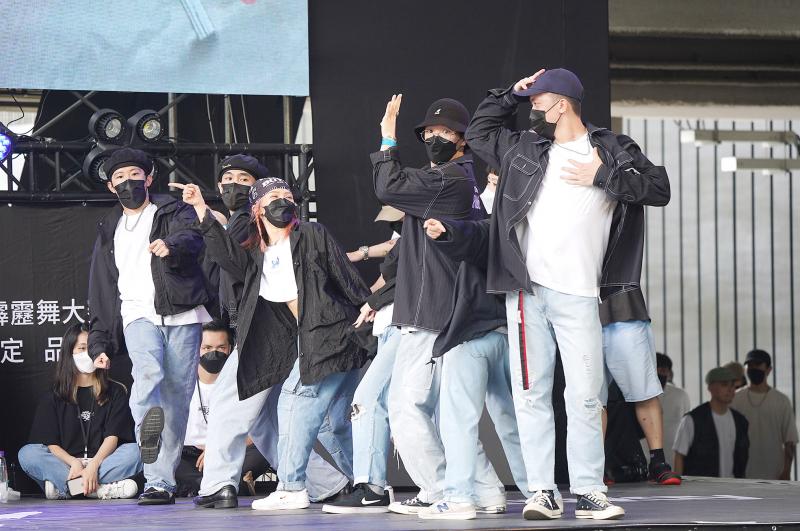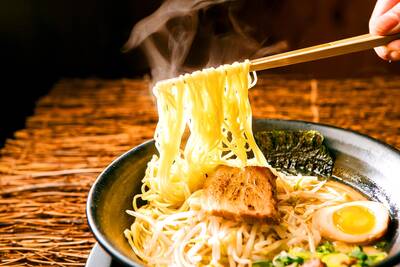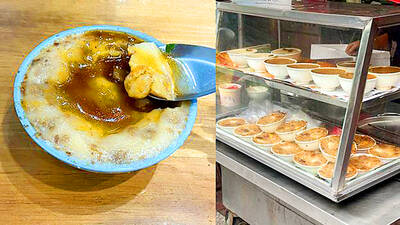A: During the trial operation period, some audience members reported broken seats, poorly marked seat numbers, high steps, stuffy auditoriums and a lack of facilities for disabled people.
B: That’s quite a lot of problems!
A: There’s more: residents living nearby have complained of noise from outdoor activities at the center’s plaza.

Photo: CNA 照片:中央社
B: Well, it seems like the “meatball” needs to up its game.
A: 不過試營運期間有觀眾反映︰北藝中心座椅破損、標示不清、樓梯陡峭、場地悶熱、無障礙規畫也不佳。
B: 問題還真不少。
A: 而且附近居民也抱怨,該中心在戶外廣場辦活動時噪音太吵。
B: 看來「大貢丸」要加油了。
(Translated by Edward Jones, Taipei Times/台北時報張聖恩)

A: Artificial intelligence technology has been causing controversy lately: a student was caught cheating with AI to win the grand prize in an art contest. B: That’s so absurd. Does this mean that AI paints better than humans? A: Maybe. Luckily, the student was later disqualified. B: And more absurdly, it’s becoming more and more popular to use AI technology to “resurrect” people. A: Yeah, some netizens even posted videos featuring the late singer CoCo Lee, who was “resurrected” by them with AI software. A: 人工智慧的爭議不斷,有學生違規使用AI參加美術展,甚至贏得首獎。 B: 真誇張,這是不是代表AI比人類還強大? A: 或許吧,幸好得獎資格被取消。 B: 還有更誇張的︰讓死者重現的「AI復活」技術越來越熱門。 A: 對啊,還有網友製作已故歌后李玟「復活」的影片呢! (By Eddy Chang, Taipei Times/台北時報張聖恩)

It’s another school day with the same ritual. You wake up to your smartphone’s alarm, scroll through messages during your commute, and listen to your favorite playlist with your wireless earbuds between classes. These devices, integrated smoothly into your daily routine, certainly make life more convenient. However, where do these devices end up after you replace them? In fact, the issue of electronic waste is a growing global concern. According to the United Nations, in 2019 alone, we generated an astonishing 53.6 million tons of e-waste—an average of 7.3kg per person. Projections hint at the figure soaring to 110

It’s no secret that Japanese people have a deep affection for noodles. Like in the rest of East Asia, noodles are an important staple food, second only to rice. Japanese people have enjoyed noodles for over 1,000 years. The first noodles came from China and were introduced around 800 CE. As time passed, noodles in Japan not only became widespread but also developed some unique Japanese characteristics. The three most popular types of noodles in Japan are ramen, soba, and udon. Ramen, typically made from wheat flour, is usually thin and firm. The dough is kneaded and left to

Rice is an essential ingredient in Taiwanese cuisine. Many foods are made of rice, adding more variety to our cooking, such as rice cake, or “gui.” Wagui is made by steaming rice flour batter in a bowl. The term “gui” refers to a type of food made from rice, while “wa” refers to a bowl. The pronunciation of “gui” in Taiwanese Hokkien is similar to the word for “nobility” in Chinese, so it is common for people to prepare various types of gui, including wagui, as offerings to the gods or ancestors,. 米是台灣重要的主食,用米製成的食品十分多元,豐富我們的飲食,如米做成的「粿」。粿的意思是米做成的糕點,碗粿是將在來米漿倒入碗中蒸熟,因而得名。粿因為音同「貴」,因此碗粿等粿食常用作供品祭拜神明和祖先。 nobility (n.) 高貴,高尚;貴族 offering (n.) 供品 While Taiwan may not be